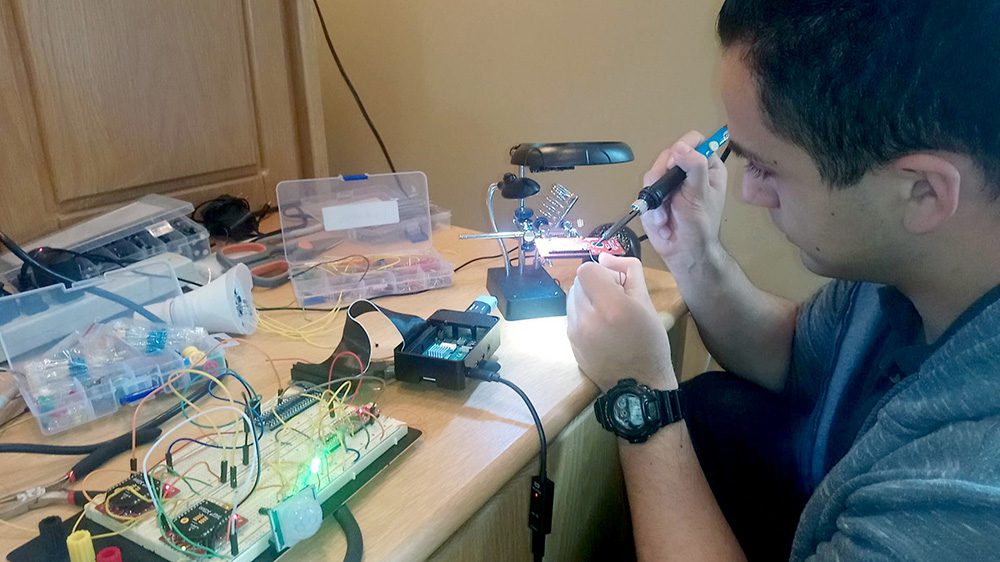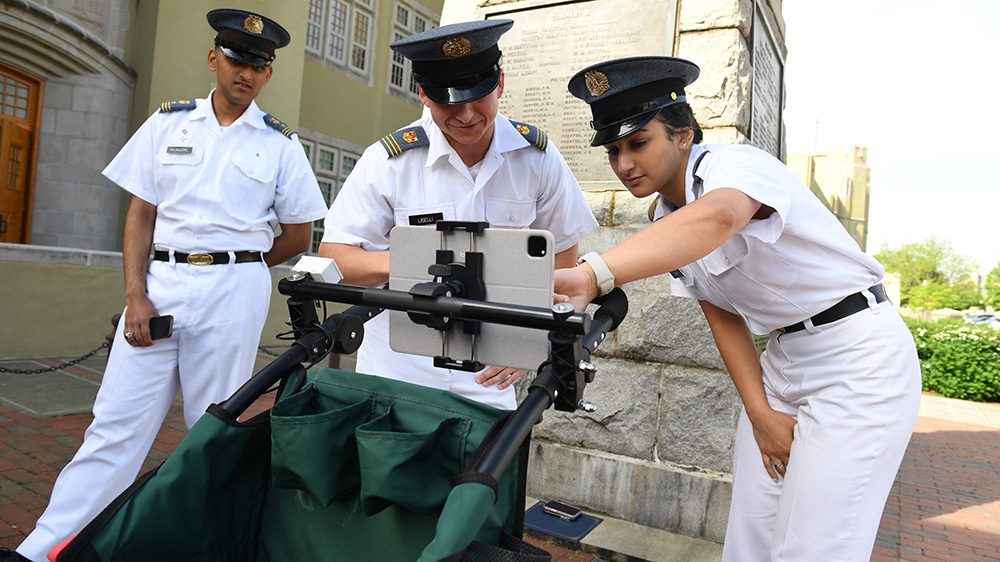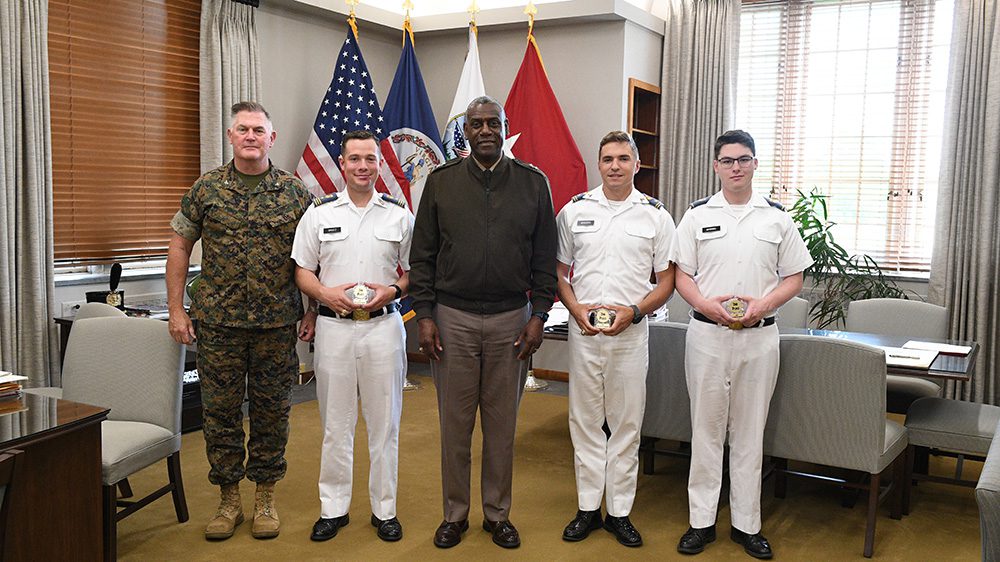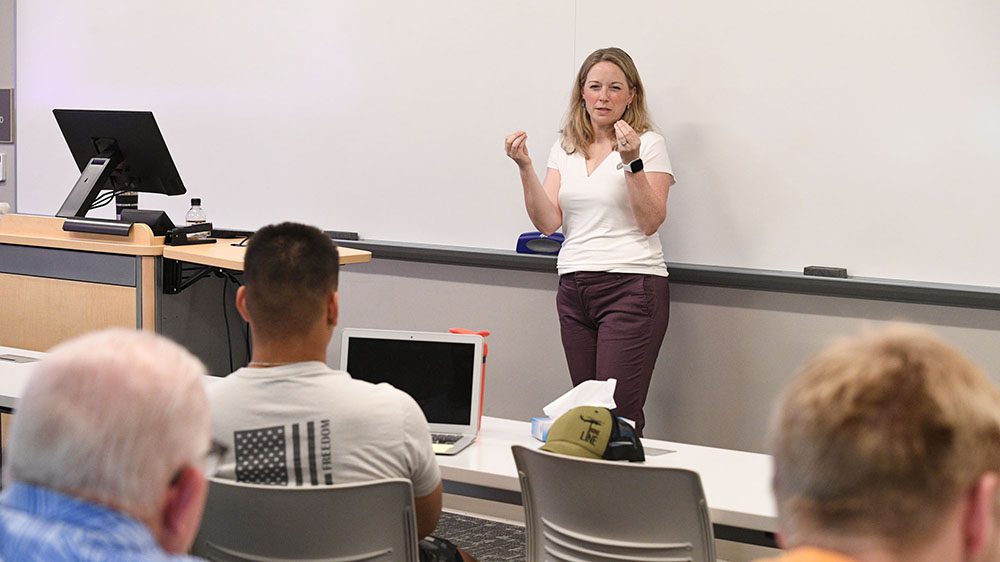During normal classes on post, cadets can fully experience undergraduate education through lectures. Many cadets, particularly STEM majors, can apply what they learn in lectures through hands-on lab work.
Mechanical engineering majors watched as machines bent metal, electrical engineering majors worked on building circuits for microelectronics and other science classes created chemical reactions to make tangible products. Cadets were able to experience firsthand what they were reading in textbooks through lab work, which brought readings and lectures to life.
When VMI, along with the rest of the country and much of the world, elected not to resume classes due to the COVID-19 pandemic, classes continued – online. So, how are cadets learning online, from their homes?
Physics, biology, engineering and chemistry professors have been filming videos of themselves doing experiments. The professors give their students the sample data obtained from the experiments and cadets perform analyses using the lab data. While this allows students to make more sense of the data analysis stage, they are not able to do hands-on work like they did at school.
Cadet Josie Freeman ’23 said it is “disappointing to not be hands-on” in labs, but she “appreciated the [professors] making themselves available through office hours and appointments.” VMI’s faculty has done an outstanding job of reaching out to cadets and supporting them in their learning as much as they can through the online format.
“I am very impressed by how quickly VMI transitioned to online learning, considering that the current distance learning environment is unprecedented,” said Cadet Eric Munro ’21. “I’m amazed at how the departments I’m taking classes with were able to adjust the curriculum to meet course objectives.”
Munro is an electrical engineering major and is grateful for his department. His professors have mailed equipment to cadets, allowing them to complete labs at home. VMI has also paid for a program called Microsoft Teams, which allows cadets to collaborate online to complete group projects.
“All in all, I believe that VMI’s quick planning and implementation of the distance learning environment is great considering how quickly the global situation was shifting back in March,” said Munro.
Other departments work with expensive, high-grade equipment and costly materials and cannot equip cadets with similar items at home. Cadet Rachael Dickenson ’22, a civil engineering major, stated that while her soils professor “does very well in converting” the class under the present circumstances, the “soils lab involves very specific tests that take time and lab equipment that is only available at school.” Now that the school is online, Dickenson and other cadets watch videos and write summaries about them. They are still learning but are missing the lab component that brings the information to life.
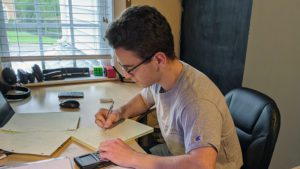
Cadet Ethan Schlussel ’22, a mechanical engineering major, studies in his home. Initially unsure about online learning, Schlussel said both cadets and faculty adapted quickly to the new learning environment.
Labs are used to convert the information from lectures to a practical setting, which helps students prepare for their careers in the real world. This matters a lot to Cadet Rebecca Browning ’20, who is majoring in electrical and computer engineering, as she prepares to become a Naval officer.
“During this time … I know that I am not receiving the same level of education for engineering classes online [versus] in person,” she said. “An imperative part of my engineering classes is the lab. The labs represent the real-world application of our course material and can only be performed with the equipment at school. A basic engineering station in our labs is [at least] $1,000 and cannot be replicated in each student’s home.”
Despite the differences from online classes, many students have found lectures for STEM classes to be surprisingly advantageous online. Cadets can pause and rewind video instruction as needed, helping them learn concepts at their own pace.
Like most VMI cadets, mechanical engineering major Cadet Ethan Schlussel ’22 had never taken online classes before this spring. He wondered what the classes would be like and questioned the quality of online education.
“At first, the classes were not going great, however, now that the semester is almost over, I’ve realized that my expectations were set too low for what we as students and they as professors can create by using only the internet,” Schlussel said. “It’s amazing how quickly we can all adapt to and improve … I feel just as satisfied with what I have learned this semester as the last. I am impressed by our ability to work together, with the understanding that this is going to be a tough situation, but we will not let it slow our education.”
While labs are not the same as they were on post, cadets appreciate the clear efforts from their professors. The VMI community is working hard to keep an active learning environment. The time-management skills, focus and motivational drive that are taught at the Institute are now being tested now – as cadets are at home, making their own schedules and completing coursework.
As the school year wraps up, cadets are working hard day and night to learn, despite the circumstances. These times are tough, but through this, cadets have proven themselves to be able to adapt and overcome whatever challenges they encounter.
